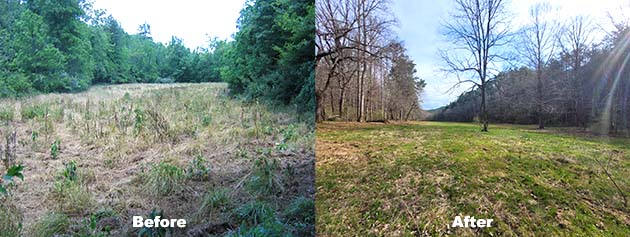Local NWTF Chapter Partners with Agencies to Improve Habitat and Ecosystem
The NWTF’s local Cherokee Chapter recently partnered with the USDA Forest Service and the Tennessee Wildlife Resources Agency to improve wildlife habitat and prevent the encroachment of invasive plant species in Tennessee’s Cherokee National Forest.
The Cherokee Chapter donated $2,500, via the Tennessee State Chapter, to TWRA, which leveraged the local chapter’s donation with Pittman-Robertson funds (dollars from hunters and shooting sports enthusiasts), providing a total of $10,000 for partnership work on the Sylco area of the national forest, just this spring.
Autumn olive, one of the targeted invasive species in this project, was once planted for erosion control in the past. Over the years, however, it has spread, and now is outcompeting native plant species throughout the forest. The encroachment of autumn olive reduces the quality of habitat for wild turkeys, other wildlife and decreases the overall biodiversity.
“We, along with TWRA and NWTF, are doing our best to remove the plant from wildlife openings to attempt to gain control of its invasion throughout the Forest,” said Bo Reynolds, biological science technician of the Cherokee National Forest.
The recent partnership between the local NWTF Cherokee Chapter, TWRA and the Forest Service helped regulate the encroachment of the invasive species through a variety of forest management practices, including mulching, mowing and herbicide applications. Forest Service biologists state they are expecting to see early successional plant species thrive in the areas where management was completed.

After: March 2022. The Baker’s Fields after previous years of spraying, burning and with recent mowing efforts. The size of the grass fields are extended greatly on all sides. Photos courtesy of Cherokee National Forest
After: March 2022. The Baker’s Fields after previous years of spraying, burning and with recent mowing efforts. The size of the grass fields are extended greatly on all sides. Photos courtesy of Cherokee National Forest
When early successional habitat is created through management, it increases the quality of habitat for wild turkeys and other game and nongame species, including white-tailed deer, bear, pollinators and many other critters that are good indicators of healthy habitats.
The work is also improving the overall health of the forest by complementing other conservation and forest restoration work the Forest Service is doing throughout the national forest.
“Projects like this highlight the importance of partnerships,” said Derek Alkire, NWTF district biologist for Alabama, Kentucky and Tennessee. “Being able to leverage resources is vitally important to complete the best habitat management work on the ground. This project also provides a great example of how local chapters can utilize the state Super Fund managed by the Tennessee State Chapter to get great work done in their local areas.”
The NWTF also recently collaborated with the Cherokee National Forest on the Hogback Stewardship Agreement.
This local project, along with the many others across the country, exemplify how the NWTF operates as a federation and how the grassroot efforts of its local chapters make a difference for wild turkeys in their respective areas. A significant amount of the NWTF’s funds are raised by its volunteers through local fundraising events and are then allocated by NWTF volunteers and conservation staff to projects that are meaningful to the chapter and contribute to the organization’s mission.
